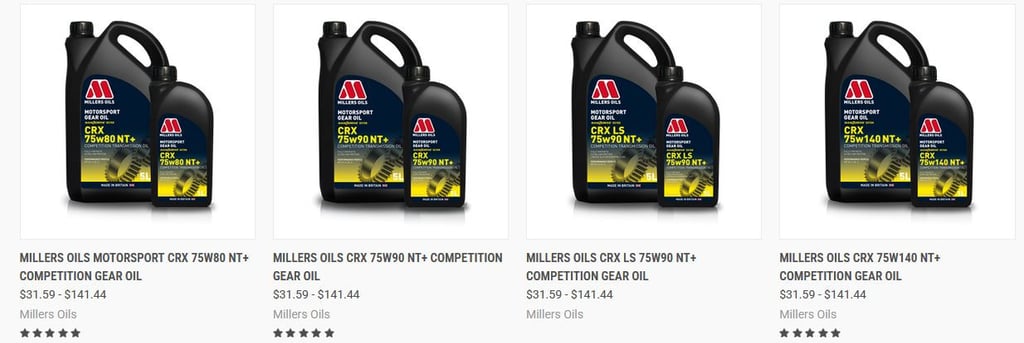Performance Oil for Car: Boost Your Engine's Power and Longevity
Performance oil for cars is essential for enhancing engine efficiency and longevity. These specialized oils are designed to meet the demands of modern engines, providing better protection, improved performance, and maintaining optimal temperature under various conditions. Understanding the types and benefits of performance oils is crucial for making informed decisions. Factors like viscosity, formulation, and the role of additives can significantly influence overall vehicle performance and maintenance.
Engine oil is the lifeblood of every engine, helping to regulate temperature and keep moving parts moving freely. Without adequate lubrication the moving parts will slowly but surely start to wear each other down meaning they won't be able to operate to their full potential, and neither will the engine as a whole.
Developed using modern technologies to keep your engine healthy, the latest engine oils contain a range of chemicals and additives that help to keep the dust and dirt away from key components while also allowing the moving parts to rotate or move up and down as they're intended to do.
As a basic rule of thumb an oil change should be carried out between 3,000 and 5,000 miles but it could be much less in the case of a competition engine. Racing takes its toll on engines and the various fluids and lubricants involved in keeping you out on track so an oil change can work as a simple health check, keeping all moving parts clean and free to operate to their full potential.
We stock a range of different racing engine oils for both two and four stroke engines, and covering a range of viscosity levels. Developed by the biggest names in motorsport and with a wealth of expertise around engines and components such as Shell, Castrol, Millers Oils, Mobil 1, Motul and Silkolene; we've got a wealth of 5w30 oil plus lubricants for diesel and petrol engines to choose from.


Understanding Performance Motor Oils
Performance motor oils are essential for optimizing engine efficiency and protecting vital components. These oils are specially formulated to meet the demanding requirements of modern vehicles, ensuring both longevity and power.
What Makes Oil High Performance?
High-performance oil is engineered to provide superior lubrication, resist thermal breakdown, and protect against sludge and deposits. The key elements that contribute to an oil's performance level include the base oil quality and the additives used in formulation. These additives enhance specific properties, making the oil suitable for a variety of engines, especially those that operate under stress.
Importance of Viscosity in Engine Performance
Viscosity plays a crucial role in engine performance, impacting oil flow and the ability to maintain a protective layer between moving parts. Choosing the right viscosity ensures optimal engine lubrication even under extreme conditions.
Comparing 10W, 15W, and 20W Oils
10W oils provide excellent low-temperature performance, ensuring quick start-up and flow in cold weather.
15W oils strike a balance between performance in both cold and warm conditions, making them versatile for various climates.
20W oils are typically thicker, providing protection at high temperatures but may not perform as well in extreme cold.

SAE Ratings and Their Impact
The Society of Automotive Engineers (SAE) assigns ratings that indicate the viscosity of motor oils, which is critical for ensuring proper lubrication. Understanding these ratings helps in selecting the right oil based on specific engine requirements and environmental conditions.
Synthetic vs. Conventional Oil: Which Is Better?
The debate between synthetic and conventional oil is ongoing. Synthetic oils are man-made and offer enhanced protection and performance, especially in high-performance scenarios. Meanwhile, conventional oils are derived from natural crude oil but may lack the same level of protection in extreme situations.
Full Synthetic Advantages
Better performance at extreme temperatures.
Improved resistance to breakdown and evaporation.
Enhanced cleaning properties, reducing engine deposits.
Synthetic Blend High Performance Benefits
Synthetic blends combine synthetic and conventional oils, providing a cost-effective solution that offers improved durability and protection compared to conventional oils alone. These blends are particularly suited for vehicles experiencing moderate performance demands.
Choosing the Right Oil for Your Car
Selecting the appropriate oil for a vehicle is critical to ensure optimal engine performance and longevity. Several factors can influence this choice, ranging from the type of engine to the specific driving conditions.
Factors to Consider for Different Engines
High Performance and Racing Engines
High-performance and racing engines require oils that can withstand extreme conditions. These engines often produce more heat and stress, making synthetic oils a popular choice. Synthetic oils provide superior lubrication, heat resistance, and protection against wear and tear.
Diesel and Regular Engines
For diesel and standard gasoline engines, the choice of oil largely depends on the manufacturer's specifications. Diesel engines, for example, often benefit from oils that include higher levels of detergents to help manage soot and deposits. Regular engines typically use conventional or synthetic blends that meet the necessary viscosity and performance standards.
Understanding Oil Change Intervals
Oil change intervals can vary significantly based on engine type and driving conditions. Regular checks are essential, as neglecting oil changes can lead to decreased performance and engine damage. Synthetic oils typically allow for longer intervals between changes compared to conventional oils.
The Role of Additives in Performance Oils
Additives significantly enhance the performance characteristics of engine oils. Understanding these can help in selecting the right oil for different applications.
Protection and Engine Longevity
Additives like anti-wear agents and detergents help protect the engine's internal components. These additives work to minimize friction and prevent sludge buildup, thus prolonging engine life.
Enhancing Fuel Economy
Some performance oils include friction-reducing additives that improve fuel efficiency. By reducing engine drag, these oils can help to achieve better miles per gallon (MPG), contributing to lower operational costs over time.
Top High Performance Oil Brands
Choosing a high-performance oil brand can significantly impact engine efficiency and longevity. Various brands offer unique formulations tailored for different needs, from everyday driving to racing scenarios.
Comparing Popular Brands and Products
Castrol GTX and Its Performance Benefits
Castrol GTX is known for its advanced formula that minimizes engine wear and maintains engine cleanliness. Its unique properties help prevent sludge buildup, making it suitable for high-mileage vehicles. This oil also provides excellent protection under extreme temperatures, ensuring reliable performance in demanding conditions.
Valvoline VR1 Racing Oil Features
Valvoline VR1 Racing Oil is specifically engineered for high-performance applications, offering superior lubrication and protection during racing events. Its enhanced levels of zinc and phosphorus provide vital anti-wear protection, essential for extended engine life under severe conditions. The oil’s formulation helps in reducing friction, ensuring the engine operates efficiently.
Price Considerations for High Performance Oils
USD Unit Price and Value
When evaluating high-performance oils, pricing can vary substantially based on the brand and specific formulation. Generally, premium oils command a higher price but often offer better protection and longevity, translating to more value per use. Understanding the cost-per-usage can help in making a more informed choice.
Sale Price Comparisons Across Brands
Sale prices often fluctuate, making it crucial to compare different brands and their offerings. Many retailers provide promotional discounts, which can enhance the overall value and savings when purchasing high-performance oils. Keeping an eye on these sales can lead to optimal choices and better price points.
Finding the Best Deals with Free Shipping
Finding high-performance oils with free shipping can significantly reduce the overall cost. Numerous online retailers frequently offer free shipping on bulk purchases or during promotional periods. This can help enthusiasts stock up on their preferred oil without incurring additional shipping costs, maximizing savings.
FAQs about High Performance Engine Oils
Understanding high performance engine oils involves addressing common misconceptions and knowing best practices for maintenance. Here are key insights into frequent questions surrounding these oils.
Common Misconceptions
There are several myths surrounding high performance engine oils that can lead to confusion among car owners. Some of the most prevalent misconceptions include:
All expensive oils are better: While premium oils often offer superior formulations, not all high-priced options are necessary for every vehicle. Choosing the right oil depends more on engine specifications and driving conditions.
Synthetic oils last forever: Although synthetic oils can last longer than conventional oils, they still require regular changes based on manufacturer recommendations. Regular maintenance is crucial for engine health.
High performance oils are only for racing: High performance oils can enhance the performance of everyday vehicles as well. They help improve fuel efficiency and extend engine life, benefiting daily drivers too.
Best Practices for Oil Maintenance
Routine oil maintenance is essential for maximizing the benefits of high performance engine oils. Adhering to best practices ensures optimal engine performance and longevity.
DIY Oil Change Kits
For those inclined to perform their own oil changes, DIY kits provide a convenient solution. These kits typically include:
Quality high performance oil specific to your vehicle type.
An oil filter designed for optimal filtration.
Essential tools, such as an oil drain pan and wrench.
Utilizing a DIY oil change kit can be cost-effective while providing a sense of accomplishment for automotive enthusiasts.
Professional Services vs. At-Home Changes
Deciding between professional oil changes and at-home efforts often depends on individual comfort and expertise levels. Professional services offer the advantage of experienced technicians who can identify potential issues during the change. They often provide:
Thorough inspections and diagnostics.
Access to high-grade lubricants tailored for specific engine needs.
Ensured compliance with warranty and maintenance schedules.
On the other hand, at-home changes can save money and allow flexibility for car owners who prefer taking a hands-on approach to vehicle maintenance.
Motorsport
Experience exceptional racing with our expert guidance.
Rodiauto Sport LLC
500 4TH ST NW Suite 102
87102 Alburquerque - NM - US.
Advice
Services
info@rodiautosport.us
© 2025. All rights reserved.
